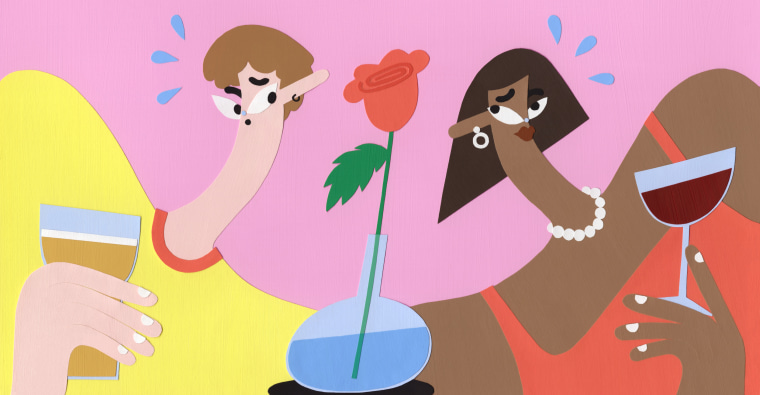Gen Z’s biggest dating hurdle? They don’t know how to flirt

Nikki Sanjongco, 24, isn’t a fan of dating apps. She prefers to meet people in person.
That’s an increasingly popular approach with one major shortcoming: People her age aren’t exactly adept at flirting.
“I think flirting is dying,” said Sanjongco, who lives in Los Angeles. “If someone thinks you’re cute, they just ask for your Instagram these days and then DM you or swipe up on your story to show they’re interested.”
Like many Gen Zers, typically defined as those born between 1997 and 2012, Sanjongco believes finding love offline is difficult as more people struggle to approach others in real life.
Recent research suggests that some Zoomers grapple with social anxiety and avoid interacting with strangers. That has created a unique challenge for some Gen Zers who are seeking to find dates in person. After years of dating online, many have become fatigued by the seemingly endless choices they’re presented. As a result, young people are turning toward in-person experiences to meet new people.
“Our generation has been so online that when it comes to talking to people, it’s a bit scary,” said Maxine Williams, 28, the founder of We Met IRL, a singles events group. “There’s not that natural sense of like, just, ‘Hey, how you doing?’”
Benjamin Camras, who has built a following of over 116,000 people on Instagram as a “flirt coach,” said he has noticed a “love-hate relationship” with dating apps among his primarily Gen Z audience.
“It’s like we’re trying so hard to get off of them, but we feel like we have to be on them,” said Camras, 38. “Like, how else am I supposed to meet people?”
Camras said dating apps have pushed people toward superficial connections that give them self-esteem boosts, which can make dating feel impersonal. Many people are so used to presenting the “highlight reel” of themselves online that it creates a disconnect when they try to form authentic connections offline.
Dating then “becomes about you and the validation and the attention you’re getting,” Camras said. That can create real-life consequences, because young people who try to flirt can get in their own heads trying to achieve similar validation, which Camras said takes them out of the moment.
“When it feels like a performance, when it feels like you’re trying to get someone to like you or see you in a certain way or you’re looking for that external validation or for that approval, you’re completely out of the flirt at that point,” Camras said.
Sanjongco said she recently chatted with a tall, single guy while she was waiting in her friend’s apartment complex in Los Angeles. He thought she was cute — but she didn’t find out until later, when her friend mentioned he’d asked about her Instagram handle.
Sanjongco believes flirting can be intimidating because people don’t know how to gauge romantic interest in others anymore. Instead, she said, they’re used to the “guaranteed interest” that dating apps show.
But some online dating profiles are too curated, she said, and in her experience, people are often “way different from the way they present themselves” on the apps.
One large reason that Gen Z has struggled with flirting? The pandemic, Williams said.
Some people began college under lockdown, preventing them from putting themselves out there and making connections in real life. That, coupled with a lifetime of connecting online, has prevented many young people from “having the opportunity to develop those skills,” Williams said.
While it can be embarrassing to get ghosted — that is, when someone abandons you out of thin air without an explanation — or “left on read” online, Williams said, the internet has created a buffer between young people and the sting of rejection. There is a “fear of being perceived” among Gen Z that can make some feel they are being judged for putting themselves out there.
Despite the difficulties Gen Z faces dating in real life, Williams said, she has noticed a change over the last few months as young people have put themselves out there more.
Eventbrite, a live experience and ticketing platform, reported that searches on its platform for such events increased by 1.5 million over the last year. At her own events, Williams said, attendees have told her they are becoming “more open to go into events alone.”
There’s a growing interest in “rejection therapy” on platforms like TikTok where young people put themselves in situations that require them to face the possibility of rejection, Williams said.
“You won’t get over it until you just keep doing it,” Williams said. “The more you do it, the less scary it is.”
It’s also important to “detach from expectations,” Camras said, because anticipating a certain outcome can hold people back when they’re flirting.
“Have the flirt be ultimately fun,” Camras said. “Yes, it’s an authentic expression of interest, but I also see it as an act of service: being able to share some energy, put a smile on someone’s face. If that’s all the flirt translates to — you had a moment, you had a laugh, you both left smiling — that’s great.”
–
Source: NBC News Gen Z’s biggest dating hurdle? They don’t know how to flirt









